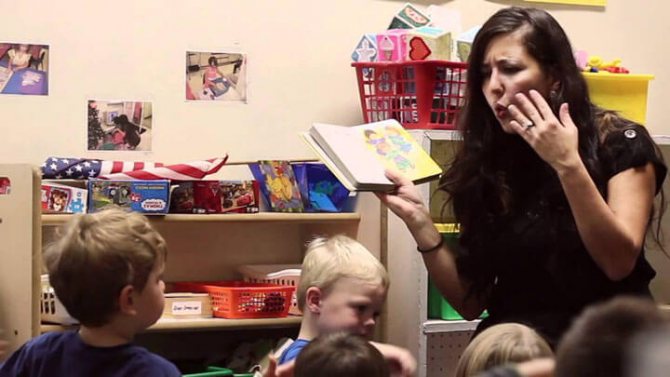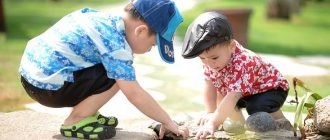The process of getting used to kindergarten can be quite problematic: with tears, protest, refusal to go to kindergarten in the morning, non-acceptance of the teacher, resentment or fear of peers, horror of the nanny, discrepancy between the desired social status and the real one in the children's group (for example, wants to be a leader, but no one follows him; a very sociable girl, but no one plays with her).
If a child brings some thing or toy from home to kindergarten, what reaction should the teacher have? He should not take away the toy, but distract the child, involve him in games with other children - at 2-3 years old the child’s attention easily switches.
It is necessary to talk with parents in advance about what things and toys can and cannot be brought to kindergarten, so as not to cause aggression from other students in the group.
Children often take their toys to kindergarten, because... in a preschool institution there is an unfamiliar environment, strangers and children, and the child really needs a feeling of home/security, especially when his beloved mom and dad are not around.
What difficulties do children have?
Problems with food
Read more: What to do with a 9 year old child
When there is a discrepancy between the diet at home and in kindergarten. As a result, such children do not want to eat anything in kindergarten, they do not want to accept anything from the teacher who teaches them. And food becomes the problem on which the baby’s attention is focused and threatens with a bunch of diseases, from gastrointestinal disorders to caries. And the worst thing is that as a result, parents can start buying junk food and sweets, justifying themselves: “If only I could eat!”
Sleep problems
If in the usual home environment the child does not sleep at the prescribed quiet time, then it is important to teach him to sleep during the day in advance at the approximate sleeping hours in the preschool educational institution. Then children will fall asleep immediately and there will be fewer problems with daytime sleep in kindergarten.
Parents should especially pay attention to this point if the child does not have a nap during the day, or sleep occurs in the evening after 4 pm.
Toilet problems
The child, just as he doesn’t want to eat, often doesn’t want to go to the toilet in kindergarten. Either he endures until home, or he constantly “wears his pants.” This is a new situation for him and this problem often results in a fairly “acute” state of the child and can even cause neurotic nocturnal enuresis and encopresis, causing another problem when the child poops in his pants.
In addition, if at home the child is used to going to the toilet in privacy, in the kindergarten there is a shared toilet (boys and girls - all together). The child in this situation will be tense, excited and unable to relax.
Features of a child's temperament
Choleric children exhibit vivid emotional reactions during the period of adaptation. If, on the contrary, phlegmatic children are slower, they do not keep up with the routine in kindergarten that teachers set for them. Such a child needs more help than other children, and it will be difficult to adapt to the children's group.
Parents' attitude towards adaptation
Conflict
Parents pass on their negative attitude to their child. And the child comes to kindergarten already wound up, irritated, with increased tension due to the fact that the parents were in conflict for some reason.
Read more: How a child develops after birth for 1 year
The problem of relationships between parents in the family. They pass on all this negative background to the child.
Defects in the upbringing of the parents themselves, if, for example, the parents discuss the teacher in front of the child, they thereby negatively influence the child (the child feels that the mother is somehow not very happy with the teacher).
Insufficient communication skills among parents, family closeness. With uncommunicative parents, the child will grow up unsociable. Such children have suspicion, wariness in communicating with peers, a tendency to make biased assessments, categorical judgments, uncertainty, and anxious and suspicious character traits. And the age of 4-8 years is a very important age for communicating and playing with peers, and the ability to resolve conflicts with them.
Consultation for parents “Adaptation to kindergarten”
Pakhomova Olesya
Consultation for parents “Adaptation to kindergarten”
It is very difficult for children of any age to start attending kindergarten . Each of them goes through a period of adaptation to kindergarten . The child's whole life changes dramatically. Changes literally burst into the usual, established life in the family: a clear daily routine, the absence of relatives and friends, the constant presence of peers, the need to listen and obey unfamiliar adults, the amount of personal attention sharply decreases.
What is adaptation ?
Adaptation is the adaptation or habituation of the body to a new environment.
At home, the child is accustomed to a certain way of life, regime, types of activities, the nature of food, relationships with others, rules of behavior, etc. In kindergarten , most of the conditions will be new and unusual for the child, the baby will have to adapt and get used to them.
In the process of adaptation - adaptation - the child’s behavior and reactions to many things can change dramatically: most often they change:
- emotional state (child cries a lot, gets irritated)
;
— appetite is disturbed (the child eats less and less frequently than usual)
;
— sleep is disturbed (the child cannot fall asleep, sleep is short-term, intermittent)
;
- acquired skills are lost (the baby may return to the pacifier or stop asking to go to the potty, speech may slow down);
— during the adaptation , children often get sick (this is due to both mental stress and the fact that the child is exposed to new viruses).
But these changes are a natural reaction to new living conditions, so they need to be treated with understanding. Don’t worry: when the child gets used to the kindergarten, everything will “go back to normal”
.
For a child kindergarten is undoubtedly a still unknown space, with new surroundings and relationships. This process requires a lot of mental energy and often takes place with tension, or even overstrain of the mental and physical forces of the body.
And getting used to kindergarten happens differently for everyone; this is largely determined by the individual and personal characteristics of the child: the type of his nervous system, the degree of sociability and goodwill, balance, the presence/absence of the habit of fulfilling the demands of adults, the development of self-service skills, etc.
With easy adaptation, the behavior of young children returns to normal within a month. A slight decrease in appetite is noted: within 10 days, the amount of food the child eats reaches the age norm, sleep improves within 20-30 days (sometimes earlier)
. Relationships with adults are almost not disturbed, motor activity does not decrease.
With an average degree of adaptation , children take longer to get used to kindergarten, up to 2-3 months.
With severe adaptation, the period of adaptation can last up to 6 months or even more.
To make the adaptation , it is necessary to ensure a smooth transition into new conditions - and at first bring the child for only 2 hours; After a few days, when the child’s emotional state and other indicators of adaptation in kindergarten have stabilized, leave it until lunch. Later, start leaving it for naps during the day. And then - for a full day. The time a child spends in kindergarten is individually determined by teachers based on observations of the child.
During the adaptation period, educators , to the best of their abilities and capabilities, try to provide an individual approach to each child and give maximum affection and care. In the first stages of a child’s entry into a kindergarten , educators strive to obtain as much information as possible about new children - about their characteristics and habits - and take them into account when interacting with children. Therefore, do not avoid conversations with teachers about your child, tell more.
Which kids adapt easier ?
• Children whose parents prepared them for visiting the kindergarten in advance, several months before this event. This preparation could consist of parents reading fairy tales about visiting kindergarten, playing “kindergarten”
with toys, walked near the kindergarten, telling the baby that he had to go there.
If the parents took the opportunity and introduced the child to the teachers in advance, then it will be much easier for the child (especially if he did not just see this “aunt”
for a few minutes, but was able to communicate with her and go to the group while the mother was nearby).
• Children who are physically healthy, i.e., have neither chronic diseases nor a predisposition to frequent colds. During the adaptation period, all the body’s forces are tense, and when you can direct them to get used to something new, without also spending money on fighting the disease, this is a good “start”
.
• Children who have independence skills. This is dressing (at least to a small extent, “potty”
etiquette, eating independently. If a child knows how to do all this, he does not waste energy on urgently learning this, but uses already developed skills.
• Children whose regime is close to the kindergarten regime. A month before visiting the kindergarten, parents should begin to adapt the child’s routine to what awaits him in the kindergarten . In order to get up easily in the morning, you need to go to bed no later than 20:30.
• It’s difficult for children who have not met one or more conditions (the more, the more difficult it will be)
.
It is especially difficult for children who perceive going to kindergarten as a surprise due to the fact that their parents did not talk about it.
• Every parent , seeing how difficult it is for the child, wants to help him adapt . And that is great. The set of measures is to create a gentle environment at home that is gentle on the baby’s nervous system, which is already working at full capacity.
• In the presence of your child, always speak positively about the teachers and the kindergarten. Even if you didn't like something. If a child has to go to this kindergarten and this group, it will be easier for him to do this, respecting the teachers. Talk about this not only with the baby. Tell someone in his presence what a good kindergarten the child now goes to and what wonderful teachers work there.
• On weekends, try not to change your child's daily routine. You can let him sleep a little longer, but you shouldn’t let him “sleep it off”
too long, which significantly shifts the daily routine.
If your child needs to “sleep off
,” it means that your sleep schedule is not organized correctly, and perhaps your baby goes to bed too late in the evening.
• Do not overload your baby during the adaptation . There are so many changes in his life now, and he doesn’t need any extra stress on his nervous system.
• Try to ensure that your baby is surrounded by a calm and conflict-free atmosphere at home. Hug your baby more often, pat him on the head, say kind words. Celebrate his successes and improvements in behavior. Praise more than scold. He really needs your support now!
• Be more tolerant of whims. They arise due to overload of the nervous system. Hug your child, help him calm down and switch him to another activity (game)
.
• Having previously agreed with the teacher, give a small toy to the garden. Babies of this age may need a toy - a substitute for their mother. By holding something close to you that is a piece of home, the child will be much calmer.
Parents and children are most How should you organize your morning so that both mother and baby have a calm day? The main rule is this: a calm mother means a calm baby. He "reads"
your uncertainty and becomes even more upset.
Speak calmly and confidently to your baby both at home and in the garden Show friendly persistence when waking up, getting dressed, and undressing in the garden . Talk to your child in a not too loud but confident voice, verbalizing everything you do. Sometimes a good helper when waking up and getting ready is the same toy that the child takes with him to kindergarten. Seeing that the bunny “so wants to go to the garden”
, the baby will be infected with his confidence and good mood.
• Let the child be taken away by the parent or relative with whom it is easier for him to part with. Educators have long noticed that a child breaks up with one of the parents relatively calmly, but does not let go of the other, continuing to worry after his departure.
• Be sure to say that you will come and indicate when (after a walk, or after lunch, or after he sleeps and eats). It’s easier for a baby to know that mom will come after some event than to wait for her every minute. Don't be late, keep your promises!
• Come up with your own farewell ritual (for example, kiss, wave, say “bye”
).After that, immediately leave: confidently and without turning around. The longer you stagnate in indecision, the more the baby worries.
• Adaptation will take place without difficulty if parents try not to do the following:
• You cannot punish or get angry with your baby because he cries when parting or at home when the need to go to kindergarten is mentioned! Remember, he has the right to such a reaction. It’s better to say again that you love him very much and will definitely come for him.
• You should avoid talking about the baby's tears with other family members in his presence. It seems that the son or daughter is still very young and does not understand adult conversations. But children, on a subtle emotional level, sense their mother’s concern, and this further intensifies children’s anxiety .
• You can’t scare people with kindergarten (“If you behave badly, you’ll go to kindergarten !”). A place that is feared will never be loved or safe.
• You cannot speak badly about the teachers and the kindergarten in front of your child. This makes the child think that the garden is a bad place and he is surrounded by bad people. Then the anxiety will not go away at all.
• You cannot deceive your child by saying that you will come very soon if, for example, the baby has to stay in kindergarten for half a day or even a full day. Let him know better that his mother will not come soon than to wait for her all day and may lose trust in the person closest to him.
When it comes to adapting a child to kindergarten , people often talk about how difficult it is for the baby and what help he needs. Entering kindergarten is the moment a child separates from his parents , and this is a test for everyone. Mom and Dad are also “tearing”
heart when they see how the baby is worried, but at first he may cry only at the mere mention that tomorrow
he will have to go to the garden .
To help yourself, you need:
• be sure that visiting the garden is really necessary for the family. For example, when a mother simply needs to work in order to make her contribution (sometimes the only one)
into family income.
Sometimes mothers send their child to kindergarten earlier than they go to work to help him adapt , picking him up early if necessary. The less doubt there is about the advisability of visiting the kindergarten, the more confidence that the child will sooner or later succeed. And the baby, reacting precisely to this confident position, adapts much faster .
“weak” at all
Creation.
adaptation system is strong enough to withstand this test, even if the tears flow like a river. It’s paradoxical, but true: it’s good that the child is crying! Believe me, he has real grief, because he is parting with the most dear person - his mother! He doesn’t yet know that you will definitely come; a routine has not yet been established. But you know what is happening, and you are sure that you will pick up the baby from the kindergarten. It’s worse when a child is so caught in the grip of stress that he can’t cry. Crying is an assistant to the nervous system; it prevents it from being overloaded. Therefore, do not be afraid of children's crying , do not be angry with the child for “whining”
.
Of course, children's tears make you worry, but you will definitely get through it too.
Be patient, understanding and discerning. And then soon the kindergarten will turn into a cozy, familiar and familiar world for the baby!
Problems of teachers and kindergarten

- Lack of competent teachers.
- A different daily routine than at home. At home the child is completely different; he is not used to what is done in kindergarten and at home.
- A large number of children around. In general, the optimal number of children in a group is 10-12 people. If it is more, then communication begins to develop according to other criteria: small groups are formed.
- High background noise in the group. And if you ask kids who has a headache at the end of the day, many will complain.
- Nervous and authoritarian teachers often shout and hit children.
- Emotional burnout of teachers. According to studies, after 10-12 years of work, teachers experience symptoms of emotional burnout.
- Compatibility between teacher and child. If the teacher is choleric and the child is phlegmatic, then this child will irritate him. Will he be able to adjust his temperament if he is a very choleric person?
- Left-hemisphere orientation of education and training, rationalism, emotional inflexibility. This is an excessive passion for mastering various subjects.
Conclusion: All these reasons create a situation where the child does not adapt to kindergarten for a long time. When he is in such a serious condition for a long time that he then needs help.
Solution
Ask yourself the question “What needs to be done to ensure that the child has a good time in kindergarten?” Any adaptation program must be tailored to a specific child and his or her characteristics.
Read more: What is empathy
Individual approach to the child
Here it is necessary to take into account the interests, inclinations and characteristics of the child’s psychological state.
Average adaptation time to kindergarten (keep in mind that the older the child, the longer the adaptation period): in a nursery - 7-10 days, in preschool age - 2-3 weeks, in older preschool age - 1 month.
In a normal family, adaptation to a preschool institution with the support of parents occurs quickly, in a dysfunctional family it takes a long time.
Up to 3 years of age, children susceptible to nervous disorders are more likely to experience anxiety, fear, depression, lethargy, lethargy, and indifference when visiting a nursery. For neurosomatically weakened children, a free regime of visiting a kindergarten or a short-day group is required.
Doctor Komarovsky: “Kindergarten is not for eating, but for running, getting tired and exploring the world”
Children's pediatrician Evgeniy Komarovsky talks about whether to send a child to kindergarten in a video:
Communication is important for a child in kindergarten. It needs to be included in games with the preferred subgroup of communication to make contacts. Those. with those children with whom the child himself wants to play.
Adaptation of a 3-4 year old child in kindergarten. article (junior group) on the topic
Adapting children to kindergarten is a very difficult task for both parents and children. One child takes two days to understand a new environment, another takes several months. How to help a 3-4 year old child get used to preschool faster? How to make the transition from home to kindergarten less painful? Both the teacher and parents need to know well the age characteristics of a 3-4 year old child.
Play becomes the leading activity in preschool age, and the fine motor skills of a preschool child develop. At this age, the child begins to draw, and not just draw lines. A child can already realize the simplest idea in a drawing: a sun, a man (the “cephalopod” stage), a ball, etc. The child can trace simple shapes along the contour and paint over the shape. The simplest plasticine crafts are available: snake (worm), snail, fungus, plate, balls.
The child's perception develops. Children 3-4 years old know basic colors, geometric shapes, and can differentiate objects by size.
There is a sharp leap in speech development. According to researchers, by two years a child’s active vocabulary includes 250-300 words, by 3 years - 800-1000 words, and by five years - 2500-3000 words. A phrase consists of 3-4 words that are grammatically related to each other, but may be imperfect in sound content.
Adaptation to kindergarten at the age of 3-4 years lasts from 2-3 weeks to 2-3 months. Parents are advised to follow a number of rules.
- Don’t be nervous yourself, don’t scold your child for tears and whims associated with the garden. Behave calmly and firmly. Don't follow the child's lead. Don’t skip kindergarten, don’t sit at home for several days, so that the child is less nervous and cries less. Irregular visits to the garden lengthen the process of addiction and make it more painful. It is advisable to comply with the same requirements for the child at home and in the garden.
- Maintain contact with the teacher, take an interest in the child’s successes, how his day went. At home, it is advisable to read books about kindergarten and show cartoons on this topic. Show in every possible way the advantages of being in the garden.
- Explain to the child that his mother will pick him up from kindergarten and will not leave him there forever. Parents must maintain in their child the confidence that he is the best, the most beloved, that they did not get rid of him by sending him to kindergarten. Parents also should not feel guilty for sending their child to kindergarten.
A child entering kindergarten must have certain skills. It is advisable to bring the daily routine in the family closer to the daily routine in the garden. The child must get up in the morning at 6.30-7.30 am in order to be in the garden by 7-7.45. Accordingly, in the evening the preschooler needs to be put to bed at 20.30-21.00.
The child must be able to eat, dress, undress himself (if the clothes do not have complex fasteners, small buttons, zippers, laces) “children learn to dress and undress in a certain sequence: take off and put on clothes, fold, hang, fasten buttons.” A child must be able to play independently, clean up toys after himself, go to the toilet (or ask) independently, and express his thoughts, feelings and desires verbally.
The most important skill is, of course, the ability to interact in a team. The role of the team is difficult to overestimate. The child must be able to wait, give in, share toys, and fulfill the teacher’s demands. The child must understand that there are many children in the group, and the teacher cannot pay as much attention to each child in the group as the child receives at home (especially if there is only one child in the family). Understanding all the difficulties associated with kindergarten, it is nevertheless necessary to send a child to kindergarten for his normal development.
A child’s readiness for kindergarten is also determined by his state of health. Children's groups can cause infectious diseases. There is no need to be afraid of this. To strengthen his immunity, a child needs to “get over the disease.” Children who do not attend kindergarten begin to get sick at school age, and this affects their academic performance. Children who went to kindergarten have some resistance to infections.
An important point is the psychological readiness of parents. Parents must understand that the transition to kindergarten is stressful for the child. The reaction to stress can be different: crying, whims, increased incidence of illness, even mild neurological manifestations (tics, hesitations in speech, enuresis). The parent must be prepared for the temporary difficulties associated with the beginning of kindergarten life.
It is important not to intimidate the child, not to shout at him, not to threaten, not to blackmail (“if you cry, mom won’t come”, etc.)
If adaptation is difficult, you can offer parents to pick up the child before bedtime, then immediately after bedtime, then at 5-6 o’clock. You can be allowed not to eat any food for a while, especially new food that is not prepared at home. This stage should not drag on too long so as not to become the norm. A child, even the smallest one, knows how to manipulate an adult well. During the adaptation period, it is important for the teacher to be friendly, but firm, to clearly explain to the child the requirements of the kindergarten: what can be done, what cannot be done, and why.
In any case, it is important to remember the importance of the team in raising a child. The baby spends most of the day in the garden. He plays, communicates, gains various skills and knowledge. Kindergarten provides systematic knowledge and skills that parents cannot always provide.
A person needs society and communication for the full development of his personality; the foundations of communication in society are laid in a preschool institution.









